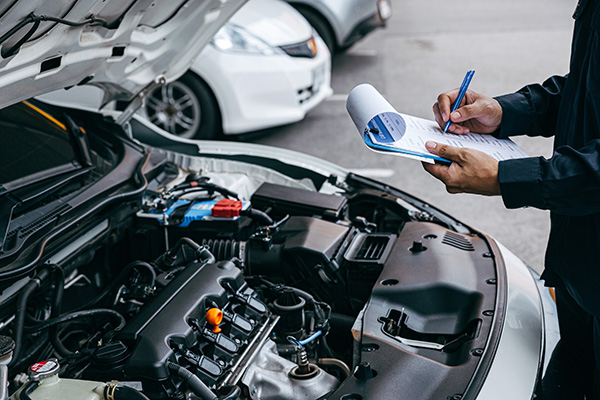
Winter on the Gulf Coast is mild compared to snow states, yet salt air, sudden cold snaps, and heavy rain create their own kind of wear. Audis handle weather well when the basics are fresh and calibrated. A focused seasonal check keeps sensors happy, brakes quiet, and electronics sealed against moisture, so you are not chasing warning lights on a busy morning.
Why Coastal Winters Need a Different Maintenance Plan
Sea air carries salt that never fully dries. It creeps into fasteners, electrical connectors, and brake hardware. Short cold spells can drop tire pressure and thicken fluids overnight, then warm afternoons hide the issue. That back and forth is rough on batteries, rubber bushings, and PCV components. A winter prep is about corrosion prevention, moisture control, and stable battery voltage as much as it is about cold weather.
Battery, Charging, and Start Stop Health
Modern Audis rely on clean voltage for everything from steering assist to adaptive lighting. A battery that was fine in summer can struggle when morning temperatures dip. We load test the battery, check alternator output and ripple, and inspect grounds at the body and engine. Start-stop systems need an AGM or EFB battery in good condition and proper registration after replacement. If cranking speed is slowing or the start-stop has disabled itself, this is the time to address it before the first chilly front rolls in.
Cooling System and Heater Performance
Coolant does more than prevent freezing. It controls corrosion inside aluminum components and helps electric auxiliary pumps and heater valves live a long life. We test the coolant protection level and pH, verify the water pump for seepage, and confirm the thermostat opens on cue. Cabin heat should arrive quickly without foggy windows. If defroster performance is weak or there is a sweet smell in the vent stream, we check for early leaks and address them before they become midwinter surprises.
Brakes, Wheel Hubs, and Corrosion Points
Salt air targets pad hardware, slider pins, and the edges of rotors. Light rust on the rotor hat may look cosmetic, but seized pins or sticky parking brake mechanisms create drag and heat. We clean and lubricate contact points with the proper high-temp compound, inspect the rear electronic parking brake function, and check the hub faces so the wheels mount true. Quiet, even braking now prevents pulsation and uneven pad wear a few months from today.
Tires, Alignment, and Rain Readiness
Gulf rain demands a strong wet grip. Tread that felt fine in August can struggle when temperatures drop and roads are slick. We measure tread at inner, center, and outer ribs, set pressures to the door placard, and check age codes. Alignment matters more in winter because worn angles shorten tread life just when you need depth for standing water. If the steering wheel sits off-center or the car follows grooves, an alignment brings stability back and keeps the inside edges from wearing thin.
PCV, Intake, and Moisture Management
Short trips on cool mornings add moisture to the crankcase. A weak PCV unit lets that moisture linger, which shows up as a light tan film under the oil cap and a rougher cold idle. On direct injection engines, intake valves can build carbon that worsens in cool, humid air. We test crankcase vacuum, inspect the PCV assembly, and recommend intake valve cleaning when idle quality and fuel trims point that way. Fresh oil at the correct specification for your Audi slows deposits and keeps timing components happy through winter.
Lights, Wipers, and Vision Systems
Rain and early sunsets demand clear vision. We test every exterior light, clean camera lenses and radar covers, and scan driver assistance modules for stored faults. Silicone wiper blades and a full washer reservoir cut glare and smear. If you have a windshield camera for lane keeping, a recalibration may be needed after glass work. It is better to confirm now than to learn about it on a foggy evening.
Seals, Drains, and Water Intrusion Checks
Sunroof and cowl drains can clog with leaf debris, then share water with body control modules or door electronics. We clear drains, reseal door vapor barriers if needed, and check for damp carpets in the footwells and trunk, where Audi places comfort modules on some models. Dry electronics are reliable electronics. A quick seal and drain service now avoids mysterious warnings after the next downpour.
Quick At-Home Checks Before Your Visit
- Verify tire pressures first thing in the morning and set them to the placard.
- Look under the oil cap for light tan moisture film after short trips.
- Turn on all lights, including rear fog on equipped models, to confirm function.
- Listen for a slow crank on the first start of the day, a hint the battery is tired.
These notes help focus the inspection where your Audi needs it most.
Coastal Winter Prep Made Easy at Romay’s Auto Service in Corpus Christi, TX
Romay’s Auto Service covers the coastal details your Audi needs, from battery load testing and coolant health to PCV checks, brake hardware service, and drain cleaning. We set tire pressures, verify alignment needs, and confirm lights and sensors are ready for dark, rainy commutes.
Give us a call to schedule, or stop by our Corpus Christi shop, and leave ready for winter roads with an Audi that feels tight, quiet, and confident.